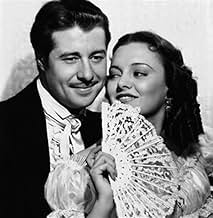Stephen Foster: [he whistles a version of Oh! Susanna] That ending isn't right yet.
Jane McDowell Foster: You know, I think the Negroes would finish it like this
[she whistles the tune]
Stephen Foster: Why, that's right! How did you know?
Jane McDowell Foster: You forget, I was brought up on Negro music.
Stephen Foster: I wish I'd been. As I boy in Pittsburgh, I heard just enough of it to want to hear more. I'd a colored nurse you know. Sometimes, she'd take me down to their little church by the river, I heard "Sweet Chariot", "Roll Jordan", all the rest.
Jane McDowell Foster: There's nothing like them, is there?
Stephen Foster: No. They have something all their own. It's... well, it's music from the heart. From the heart of a simple people. That's why it moves you like it does. And by jingo, it's the only real American contribution to music. I wonder...
Jane McDowell Foster: Wonder what?
Stephen Foster: Why no one's taken the trouble to write it down; to develop the material and compose original music in the same mood.
Jane McDowell Foster: Well, why don't you, Stephen?
Stephen Foster: Why don't I? Well, why don't I?
Jane McDowell Foster: You can, I'm sure. You have a wonderful feeling for it.
Stephen Foster: If I do, it'll be your fault. You'll have to take the blame for it. Because you'll be the music. You'll be all the songs I'll ever write. Without you, I don't think I could write them. I think they'd just, well they'd just die.
Jane McDowell Foster: Then we mustn't let them die.
































